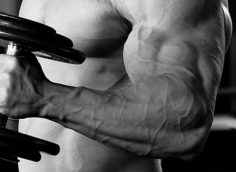For fat loss, what's one of the biggest mistakes that even experienced lifters make? It's this: getting into a caloric deficit by using mostly caloric restriction.
Wait, what? "Caloric deficit" and "calorie restriction" are kinda the same thing, right? Well, yes and no.
Sure, the most important factor for fat loss is being in a caloric deficit (along with consuming sufficient protein). If you're in a caloric deficit, you will lose fat. That's a fact, barring some rare medical problem.
But a caloric deficit doesn't just mean eating less. It means consuming less energy than you're USING every day. You can create a deficit by reducing food intake, increasing activity levels, or both.

On the left, the caloric intake is 2500 calories per day, and the energy expenditure is 3000. On the right, the caloric intake is 1500, and the energy expenditure is 2000. In both cases, the deficit is 500 calories per day. Both will lead to the same fat loss.
But consuming more calories and moving more has several advantages:
- You're more likely to maintain or even increase muscle mass.
- You're less hungry. You're eating significantly more food.
- You can more easily cover micronutrient needs. If you eat more, you don't simply increase macronutrients (carbs, protein, fats) but also vitamins, minerals, and fiber.
- It's more sustainable. While you can force yourself to consume super-low calories for a short period of time, it's not sustainable. That's why more than 85% of the people who lose weight regain it.
- You have a lower risk of metabolic adaptations. The decrease in metabolic rate and energy expenditure via hormonal changes – like lowered T3 levels, increased leptin, lowered testosterone and estrogen, and increased cortisol – occurs mostly in response to food deprivation.
- You'll have fewer cravings. Eating more allows you to keep carbs higher. A higher carb intake minimizes cravings by preventing an excessive drop in leptin (among other things).
Achieving a caloric deficit while eating plenty of food doesn't have as much of an effect. But if your deficit comes from a very large caloric restriction, all kinds of bad things can happen.
For example, the more you cut calories down, the more likely you are to lose muscle mass while dieting. But doesn't eating plenty of protein prevent that? Only to a small extent.
A lot of the protein you ingest is either turned into energy or used to produce neurotransmitters. Only around 10% of the protein you eat is used to build (or repair) muscle. Even if you increase protein by 50 grams per day, only about 5 grams will be used to repair and build muscle tissue.
Sure, a lot of the 50 grams will be used for energy – which can be muscle-sparing as there's less need to break down muscle for fuel – but that's an inefficient process. To make 1 gram of glucose to be used for fuel, you'll need 1.6 grams of amino acids converted by the liver.
In our example, if you increase protein intake by 50 grams per day, at the most, you can produce 31 grams of glucose. And since some of that protein will be sent to the muscles or to make neurotransmitters, it's likely closer to 20 to 25 grams. In other words, you'd need to increase your protein intake by a lot to be as effective as a small number of carbs.
More importantly, carbs aren't just about energy for building muscle:
- Carbs increase mTOR levels, which increase protein synthesis.
- Carbs increase IGF-1, which is highly anabolic.
- Carbs increase insulin, which isn't the devil that some make it out to be. It's quite anabolic and anti-catabolic.
- Carbs help decrease cortisol. The cortisol response to training is much higher when carb intake is low.
- The higher you can keep your carbs while dieting and training to lose fat, the more likely you are to keep your muscle mass or increase it.
I worked with an IFBB pro-bodybuilder who had used a low-carb diet with no cardio for years. His top competition weight was 176 pounds. He switched to a higher-carb approach – eating about 300 grams per day while dieting down. He also did a lot of low-intensity activity like walking. He was then able to compete at 205 pounds and was just as lean.
Increasing non-stressful physical activity is a better approach to getting lean than using strict food restriction.
Walking or hiking is my favorite. I advise clients to shoot for 10,000 steps a day. Basically, just try to move as much as possible throughout the day. I also recommend adding steady-state cardio or playing basketball.
Increasing caloric expenditure via very hard training will have its own set of problems. Your body won't be able to recover from it. But low-stress activity is perfectly fine.





